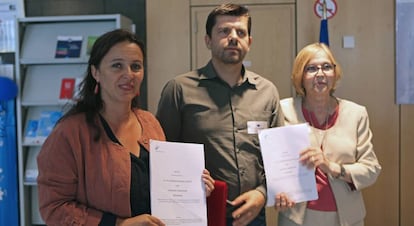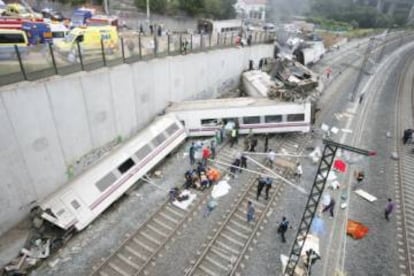Galicia train crash investigation was not independent, says Brussels
European railway agency asks for a new inquiry into 2013 accident that killed 80 and injured 152 near Santiago de Compostela


Brussels is questioning the way Spanish authorities have been investigating a 2013 train crash that killed 80 people and injured 152 near Santiago de Compostela, in the northwestern region of Galicia.
A report released on Thursday by the European Union Agency for Railways states that the worst railway accident in Spain in over four decades “has not been investigated in an independent manner.”
Driver solely to blame?
The driver, who was in charge of a dual high-speed/regular-speed Alvia train, was distracted by a call from the conductor just as he was entering a bend where the speed limit dropped sharply. By the time he realized his mistake, it was too late and the train took the curve at nearly 200 km/h, derailing and slamming against a wall.
But victims’ groups note that security systems inside the train or on the rail tracks that could have prevented this human error were not activated. An automated speed control system called ERTMS (European Rail Traffic Management System) had been installed four kilometers before the curve, but deactivated a year earlier because of system glitches. It took another year after the crash before the mechanism was repaired and reinstalled.
The document questions the way Spain’s Railway Accidents Investigation Commission (CIAF) conducted the investigation, and suggests the need for a new inquiry.
Considering the relevance of the accident, the agency considers that a new investigation “should be opened following the proper requisites of independence.”
The European agency delivered the report to a group representing victims of the crash, in the presence of a representative from the regional party Galician Nationalist Bloc (BNG).
Ana Miranda of BNG, who has been fighting for months to bring this document to public attention, called the report “damning.”
Although it was completed over five months ago, the European report did not emerge until after the June 26 national election. Victims had collected nearly 300,000 signatures on Change.org to demand that authorities release it.
Jesús Domínguez, the president of the victims’ association and one of the passengers on the Alvia train that derailed on July 24, 2013, said that they will deliver the report to the judicial authorities in charge of the criminal inquiry, and that they will further demand the creation of an independent committee to analyze the facts.

“This report makes it clear that the root causes have not been investigated,” he said.
The Brussels report says that the Spanish investigation focused on the train driver’s human error while ignoring “essential questions regarding the origin of the accident.”
The text insists on the fact that Spanish authorities focused on the derailment while failing to provide details about other issues that may have played a role in the crash. So far, prosecutors have only held the train driver, Francisco José Garzón, criminally responsible even though the original investigating judge placed 27 former managers and technicians at Adif, the rail track operator, under official investigation.
Sign up for our newsletter
EL PAÍS English Edition has launched a weekly newsletter. Sign up today to receive a selection of our best stories in your inbox every Saturday morning. For full details about how to subscribe, click here.
The European railway agency has offered Spain its own experts in the event that a new inquiry should be opened.
The European report contradicts the message that Ana Pastor, the public works minister, relayed to victims as to the independence of the state’s investigative commission. EU investigators note that members of Adif, which manages railway infrastructure, and Renfe, the train operator, took part in the inquiry, in violation of European regulations on independence.
Now, victims of the crash want Pastor to resign. “She lied to us,” said Domínguez.
English version by Susana Urra.
Tu suscripción se está usando en otro dispositivo
¿Quieres añadir otro usuario a tu suscripción?
Si continúas leyendo en este dispositivo, no se podrá leer en el otro.
FlechaTu suscripción se está usando en otro dispositivo y solo puedes acceder a EL PAÍS desde un dispositivo a la vez.
Si quieres compartir tu cuenta, cambia tu suscripción a la modalidad Premium, así podrás añadir otro usuario. Cada uno accederá con su propia cuenta de email, lo que os permitirá personalizar vuestra experiencia en EL PAÍS.
¿Tienes una suscripción de empresa? Accede aquí para contratar más cuentas.
En el caso de no saber quién está usando tu cuenta, te recomendamos cambiar tu contraseña aquí.
Si decides continuar compartiendo tu cuenta, este mensaje se mostrará en tu dispositivo y en el de la otra persona que está usando tu cuenta de forma indefinida, afectando a tu experiencia de lectura. Puedes consultar aquí los términos y condiciones de la suscripción digital.








































